Author: Lucio Chachamovich

-
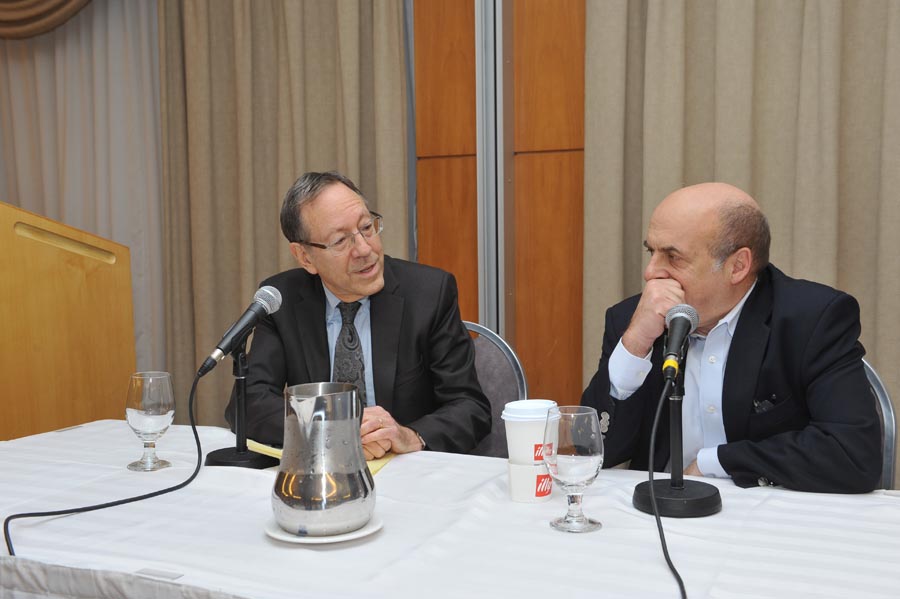
-
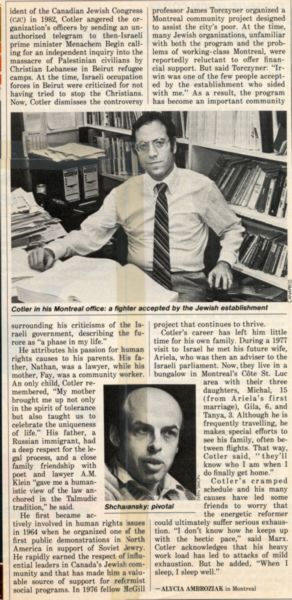 Newsclipping about Irwin Cotler from Macleans Magazine describing his devotion to the Jewish community in Montreal.Photo Credit : Jewish Public Library - Archives
Newsclipping about Irwin Cotler from Macleans Magazine describing his devotion to the Jewish community in Montreal.Photo Credit : Jewish Public Library - Archives -
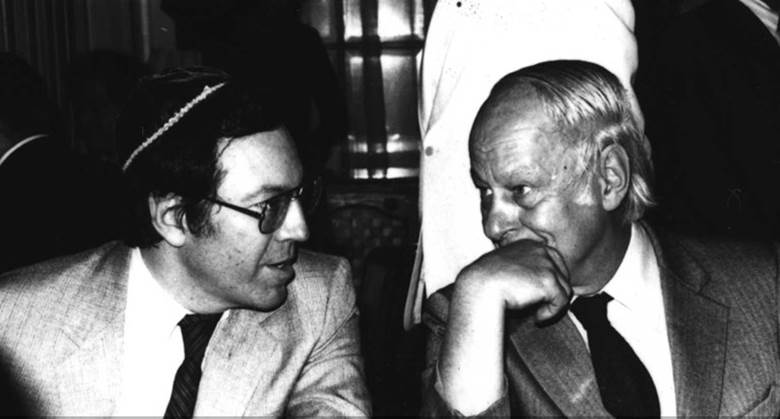 Irwin Cotler and Premier Réné Lévesque, 1982.Photo Credit : Alex Dworkin Canadian Jewish Archives
Irwin Cotler and Premier Réné Lévesque, 1982.Photo Credit : Alex Dworkin Canadian Jewish Archives -
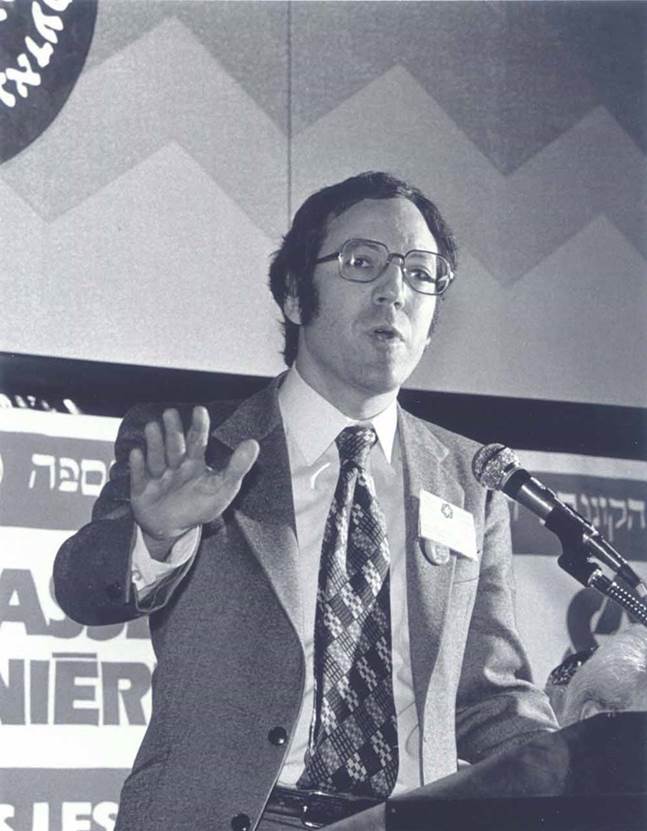 Irwin Cotler.Photo Credit : Alex Dworkin Canadian Jewish Archives
Irwin Cotler.Photo Credit : Alex Dworkin Canadian Jewish Archives -
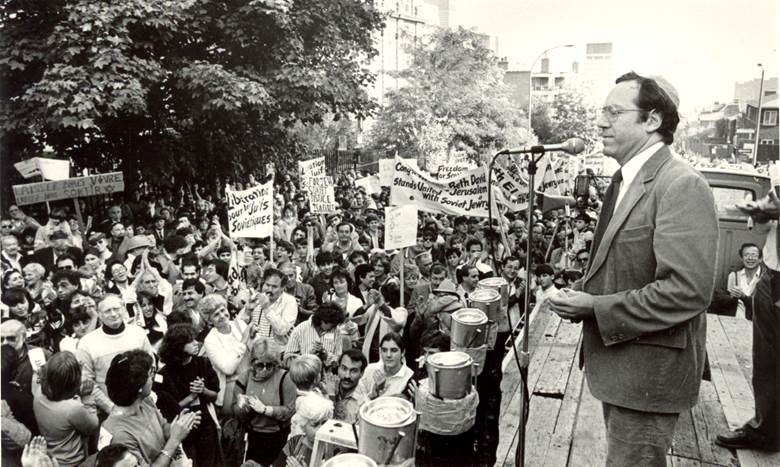 Irwin Cotler speaking at a Soviet Jewry demonstration at Russian Embassy, 1985.Photo Credit : Alex Dworkin Canadian Jewish Archives
Irwin Cotler speaking at a Soviet Jewry demonstration at Russian Embassy, 1985.Photo Credit : Alex Dworkin Canadian Jewish Archives
Irwin Cotler
Irwin Cotler is a Montreal-based human rights lawyer, former Attorney General and Minister of Justice for Canada, who was appointed to the Order of Canada in 1992.
Cotler, the son of a lawyer, received his undergraduate and law degrees at McGill and his Master of Laws from Yale University. He was a professor of law at McGill, where he specialized in human rights and international law, and taught the future NDP-leader, Thomas Mulcair. A tireless defender of civil rights, Cotler has been prominent in many human rights organizations and battles over the decades, including the plight of Soviet Jews, defending international dissidents – such as Nelson Mandela, Jacobo Timerman, Natan Shranasky, Andrei Sakharov and others – and fighting for equal rights for all.
He entered politics in 1999 as a Member of Parliament for Mount-Royal, winning his seat with 92% of the votes in a by-election. He served as Minister of Justice and Attorney General under Prime Minister Paul Martin, from 2003 to 2006, and sat as a Member of Parliament until 2014. While Minister of Justice, he introduced the National Justice Initiative Against Racism, as well as legislation that would lead to equal marriage rights in Canada. During his time in government, he sat on many committees, including Global Affairs, Security & Public Health, Domestic Affairs, Aboriginal Affairs and Canada-US Affairs.
Cotler served as Chief Counsel on the Deschenes Commission investigating War Criminals in Canada. He was also President of the Canadian Jewish Congress.
Learn More:
http://www.theglobeandmail.com/news/politics/veteran-liberal-mp-irwin-cotler-to-retire-from-politics/article16706618/
https://www.youtube.com/watch?v=7tkQMNgcey8
https://irwincotler.liberal.ca/biography/
http://www.raoulwallenbergcentre.org/irwin-cotler/
https://twitter.com/IrwinCotler?ref_src=twsrc%5Egoogle%7Ctwcamp%5Eserp%7Ctwgr%5Eauthor

-
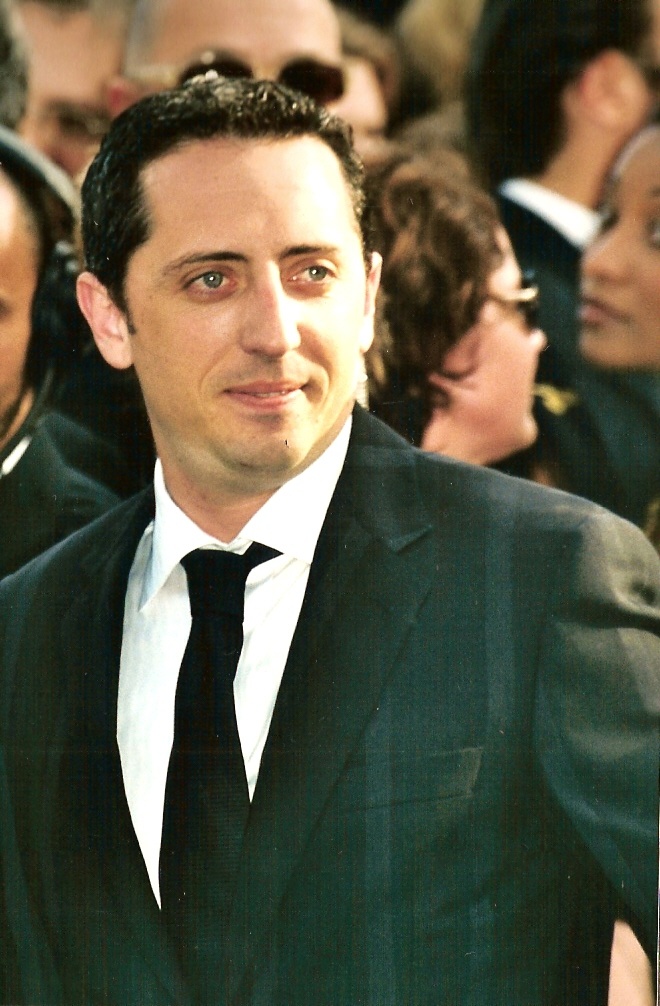 Photo Credit : Georges Biard
Photo Credit : Georges Biard -
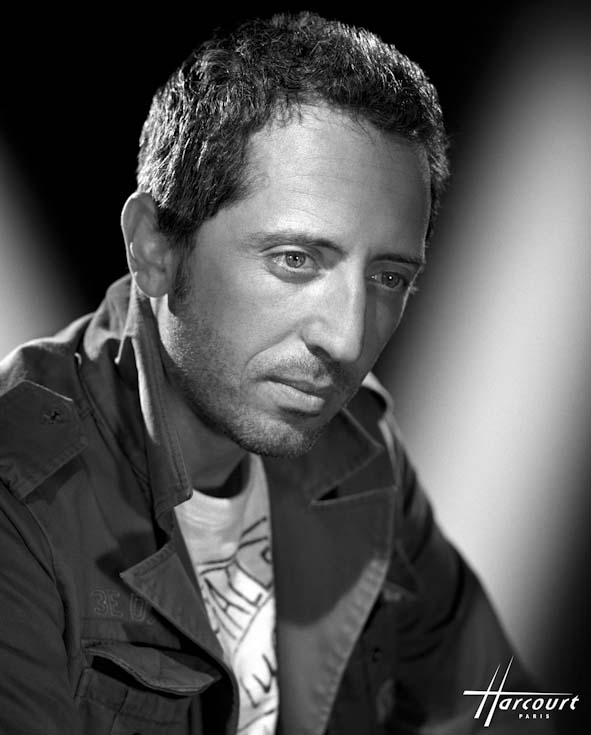 Photo Credit : Studio Harcourt
Photo Credit : Studio Harcourt -
 Photo Credit : S. Camelot (Flickr)
Photo Credit : S. Camelot (Flickr)
Gad Elmaleh
Gad Elmaleh is a Moroccan-born, French Jewish actor and comedian, often referred to as the "Jerry Seinfeld of France."
Born in Casablanca, Elmaleh was born into a theatrical Jewish family. His father was a mime and two of his siblings are actors, a stage director and a singer. He left Morocco in 1988 to study Political Science at McGill University. While a student in Canada, he also worked on radio and comedies. In 1992, he moved to Paris.
In Paris, despite an inconsistent history of schooling, Elmaleh was accepted into the prestigious drama school Cours Florent, where he studied with French actress Isabelle Nanty. There, in 1996, he wrote and performed a one-man show about his experiences in Montreal and Paris, called Décalages. His second one-man show, La vie normale, showed off not only his talent as a scriptwriter, but as an actor. Since that time, he has acted in over 40 roles.
Raised in multilingual Morocco, speaking French, Arabic and Hebrew, Elmaleh has done stand-up in all three languages. He has recently decided to challenge himself to do comedy routines in English and has since relocated to the US. He said that he prepares by practicing English pronunciation every day for two hours.
Learn More:
Public Radio International
Comedians in Cars Getting Coffee with Gad Elmaleh

-
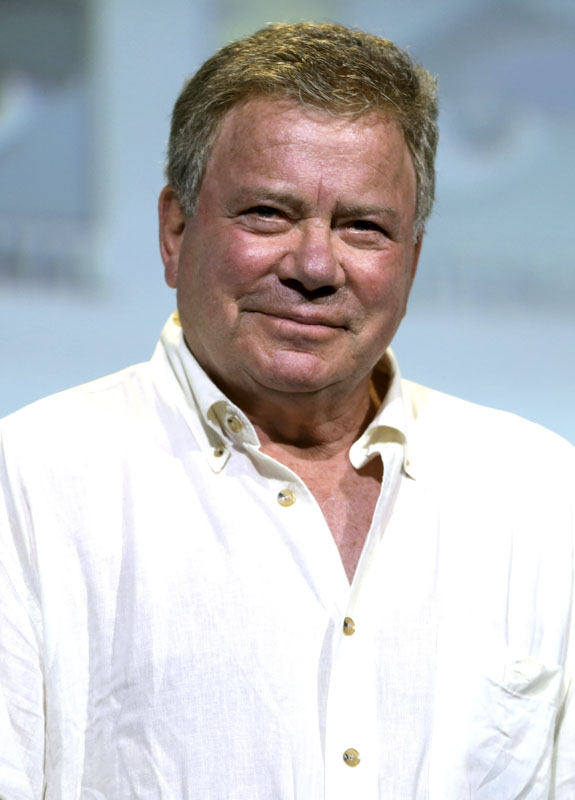 William Shatner, 2016.Photo Credit : Gage Skidmore
William Shatner, 2016.Photo Credit : Gage Skidmore -
 A 1967 episode of Star Trek.Photo Credit : Classic Film
A 1967 episode of Star Trek.Photo Credit : Classic Film -
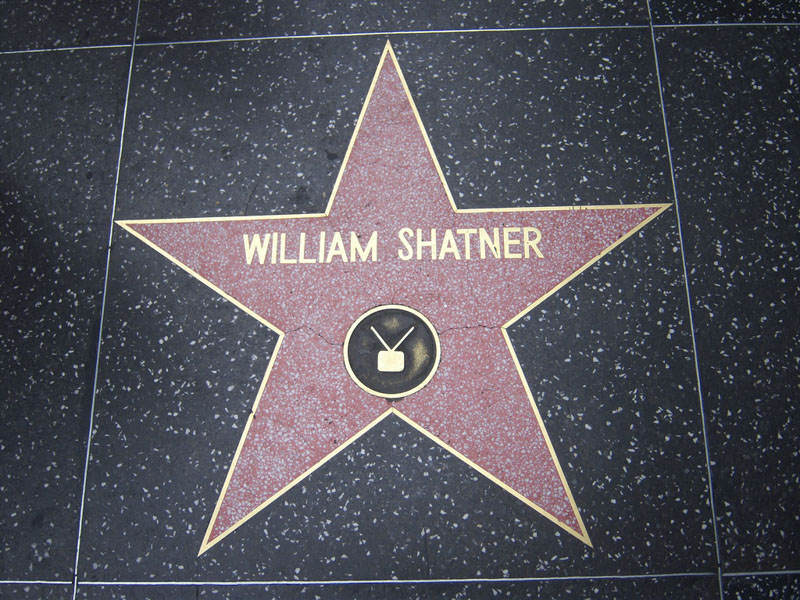 William Shatner’s star on the Hollywood Walk of Fame.Photo Credit : Loren Javier
William Shatner’s star on the Hollywood Walk of Fame.Photo Credit : Loren Javier -
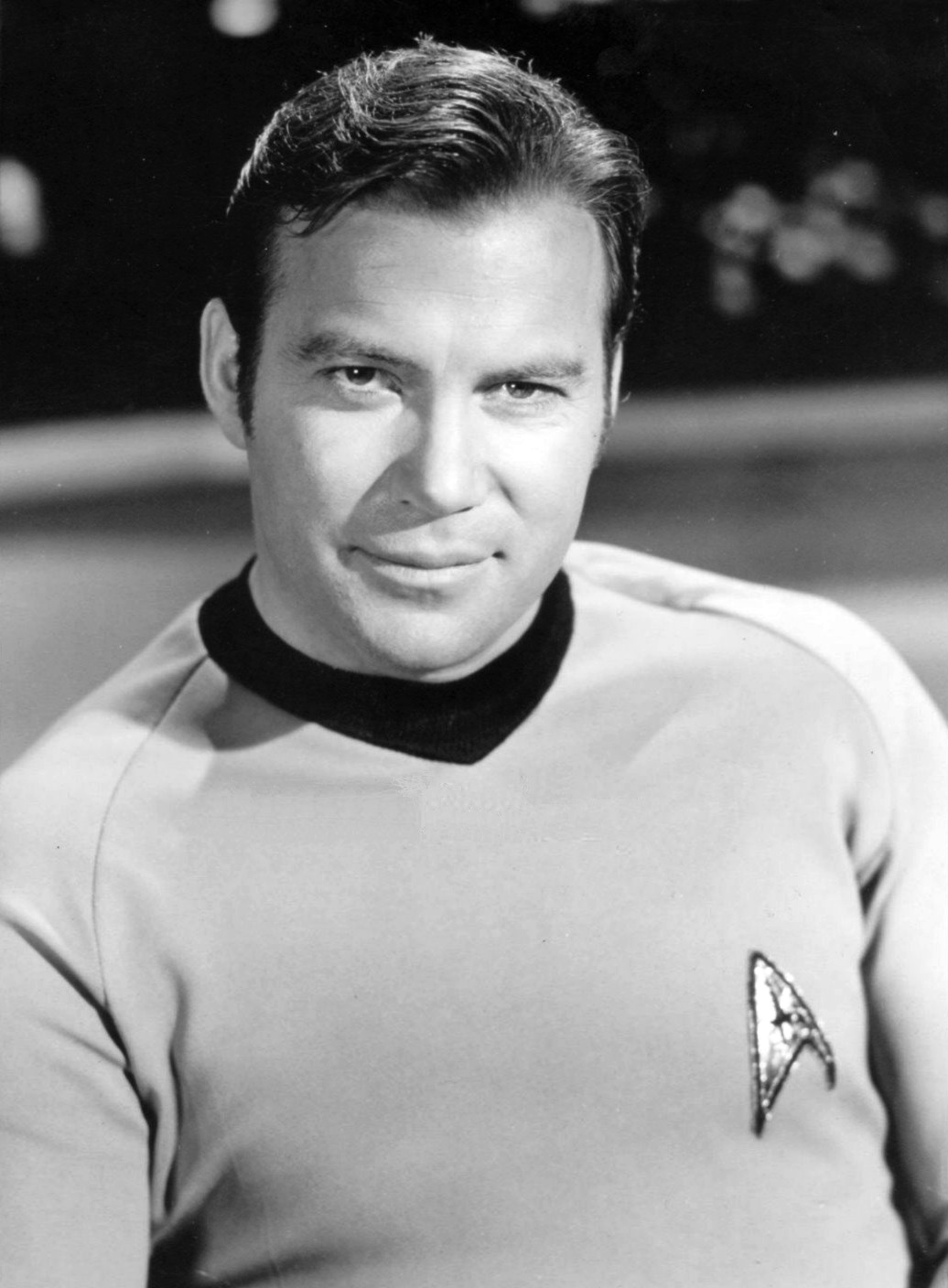 William Shatner is perhaps best known for his role as Captain Kirk on Star Trek (1966-1969).Photo Credit : NBC Television
William Shatner is perhaps best known for his role as Captain Kirk on Star Trek (1966-1969).Photo Credit : NBC Television
William Shatner
William Shatner is an Emmy Award-winning Canadian actor, singer, director and author, best known as Captain James Kirk on TV’s Star Trek.
Born in Notre-Dame-de-Grâce in Montreal, Shatner first performed in the early 1950s. During his McGill years (he graduated in 1952), he spent his summers with the Royal Mount Theatre Company and became a member of the National Repertory Theatre of Ottawa. He also performed with Sir Tyrone Guthrie at the Stratford Shakespeare Festival.
Shatner’s first exposure to Broadway was in Tamburlaine the Great in 1956, followed by other Broadway shows. His film break came in 1958 as Alexis Karamazov, opposite Yul Brynner, Lee Cobb and Richard Baseheart in The Brothers Karamazov. TV roles followed, and in 1965, he won a role in a TV series, For the People. He also appeared on Goodyear Television Playhouse, Studio One and Playhouse 90.
The following year, Shatner took on the role of Captain James T. Kirk on Star Trek. Although the show was cancelled after only three seasons, its status as a pop culture phenomenon has never abated. Shatner’s distinctive voice and character have long entered the annals of popular culture and lexicon. Shatner himself resurrected Captain Kirk in over a dozen movies, video games and other productions of Star Trek. He has over 200 acting credits and 13 director credits.
Shatner made history during a 1968 episode of Star Trek, entitled “Plato’s Stepchildren”, which allegedly broadcast the first interracial kiss on American television.
Shatner’s diverse career includes recording spoken word albums and covers of others performers. In 1966, he starred in Incubus, one of four films ever produced in Esperanto, a constructed language intended to serve as an international language to overcome linguistic differences, created by a Polish Jew at the turn of the century. Shatner has authored many books and science fiction novels. Later in his career, he starred or appeared in Rescue 911, TJ Hooker, The Practice, Boston Legal and several films.
Shatner has won a Golden Globe, the Theatre World Award, the Governor’s General Performing Arts Award and two Emmy awards for his work. He also has a star on Hollywood’s Walk of Fame.
Learn More:
http://www.biography.com/people/william-shatner-9480789#personal-life
http://williamshatner.com/ws/
https://en.wikipedia.org/wiki/William_Shatner
http://www.hollywoodreporter.com/heat-vision/william-shatner-is-ready-return-862167
https://www.nasa.gov/content/nasa-honors-william-shatner-with-distinguished-public-service-medal

-
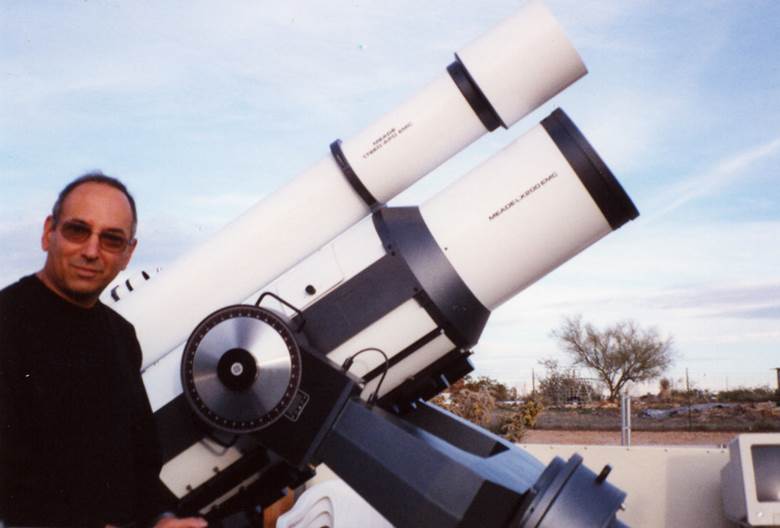 David H. Levy with Obadiah, his largest automated telescope (2009).Photo Credit : Wendee Levy
David H. Levy with Obadiah, his largest automated telescope (2009).Photo Credit : Wendee Levy -
 A NASA Hubble Space Telescope image of comet Shoemaker-Levy 9, taken on May 17, 1994.Photo Credit : NASA, ESA, and H. Weaver and E. Smith (STScI)
A NASA Hubble Space Telescope image of comet Shoemaker-Levy 9, taken on May 17, 1994.Photo Credit : NASA, ESA, and H. Weaver and E. Smith (STScI) -
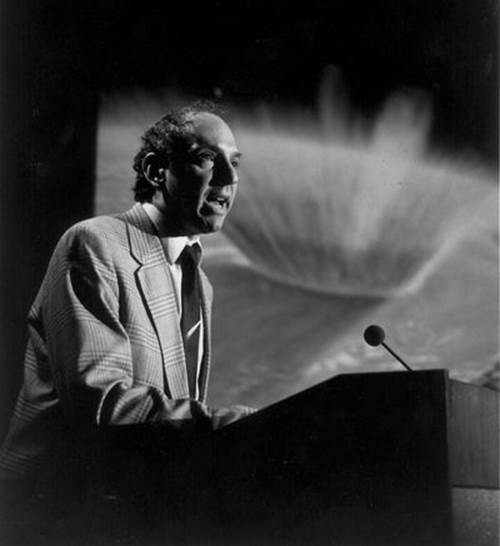 David H Levy giving a speech at NASA’s Jet Propulsion Laboratory.Photo Credit : http://www2.jpl.nasa.gov/galileo/mess34/
David H Levy giving a speech at NASA’s Jet Propulsion Laboratory.Photo Credit : http://www2.jpl.nasa.gov/galileo/mess34/
David H. Levy
David H. Levy is one of the world’s most celebrated amateur astronomers, who even has an asteroid – 3673 Levy – named after him.
Levy was born in Montreal and developed a keen interest in astronomy early on in his life. After completing a bachelor’s and master’s degree in English literature, he dedicated much of his time to exploring the sky. Through his efforts, Levy has discovered 22 comets – nine of which he discovered using his own backyard telescopes. In fact, in 2010, Levy became the first person to have discovered comets visually, photographically and electronically.
One of Levy’s most significant discoveries was that of the fragmented comet Shoemaker-Levy 9 in 1994. This comet collided with Jupiter, producing one of the most spectacular explosions ever witnessed anywhere in the world.
Levy has gone on to write 35 highly popular books and articles for periodicals including Astronomy Magazine, Sky News and Sky and Telescope. He has won a number of awards including the C.A. Chant Medal of the Royal Astronomical Society of Canada (1980), the Amateur Achievement Award of the Astronomical Society of the Pacific (1993), and the Smithsonian Astrophysical Observatory’s Edgar Wilson Award for the discovery of comets (2007). He has won an Emmy for his part in writing the Discovery Channel documentary, Three Minutes to Impact. He has given lectures and appeared on television shows around the world including ABC’s World News Tonight, The Today Show, Good Morning America, and PBS.
Today, Levy resides in Arizona with his wife, Wendee Levy. They operate the Jarnac Observatory and host a weekly radio show available at www.letstalkstars.com. He is also the President of the National Sharing the Sky Foundation, an organization intended to inspire new generations to develop an inquiring interest in the sciences.
Learn More:
https://en.wikipedia.org/wiki/David_H._Levy
http://www.britannica.com/biography/David-H-Levy
http://jarnac.jarnac.org/aboutdavid.htm
http://www.astronomy.com/magazine/press-releases/2009/01/david-h-levy-joins-astronomy-magazine-as-contributing-editor

-
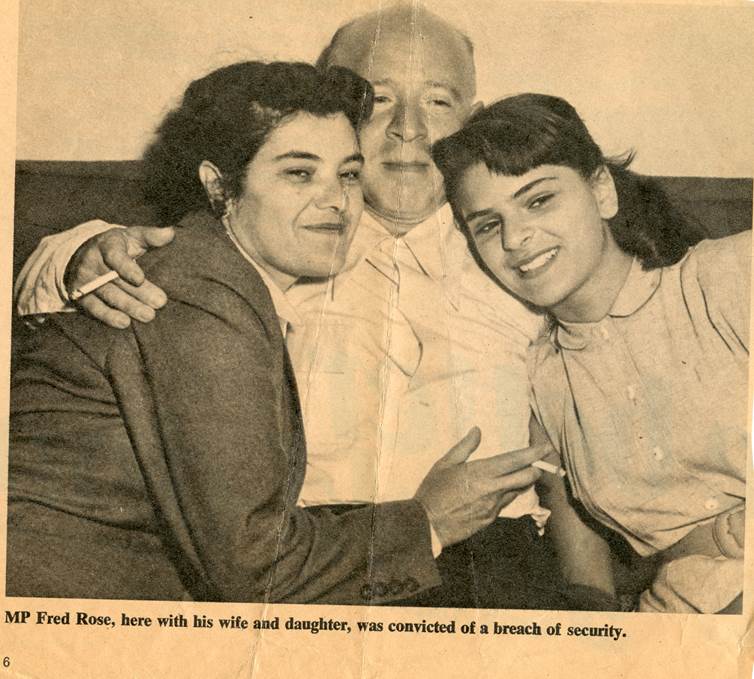 News clipping of MP Fred Rose, with his wife and daughter (1950s).Photo Credit : Jewish Public Library - Archives
News clipping of MP Fred Rose, with his wife and daughter (1950s).Photo Credit : Jewish Public Library - Archives -
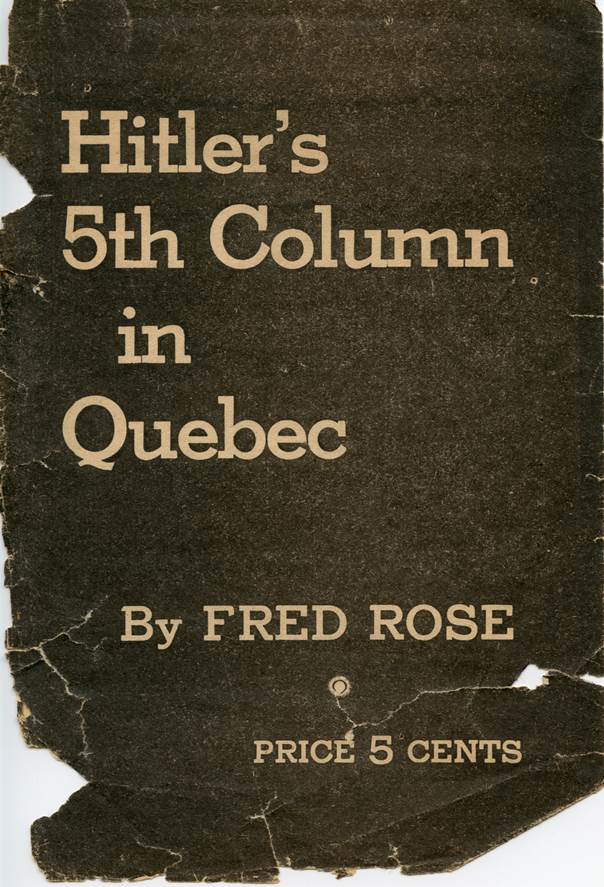 Fred Rose’s pamphlet detailing anti-Semitism and Fascism in Quebec (1940s).Photo Credit : Jewish Public Library - Archives
Fred Rose’s pamphlet detailing anti-Semitism and Fascism in Quebec (1940s).Photo Credit : Jewish Public Library - Archives -
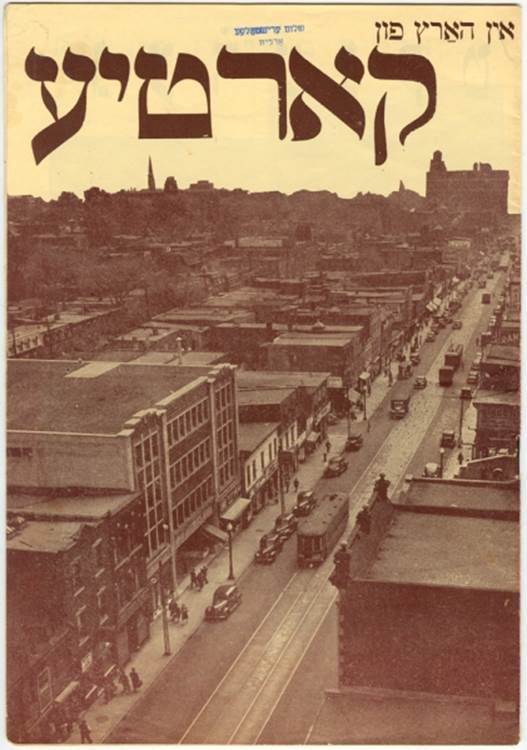 Yiddish language Fred Rose re-election poster as the Labour Progressive Candidate in the Cartier District, 1943.Photo Credit : Jewish Public Library - Archives
Yiddish language Fred Rose re-election poster as the Labour Progressive Candidate in the Cartier District, 1943.Photo Credit : Jewish Public Library - Archives -
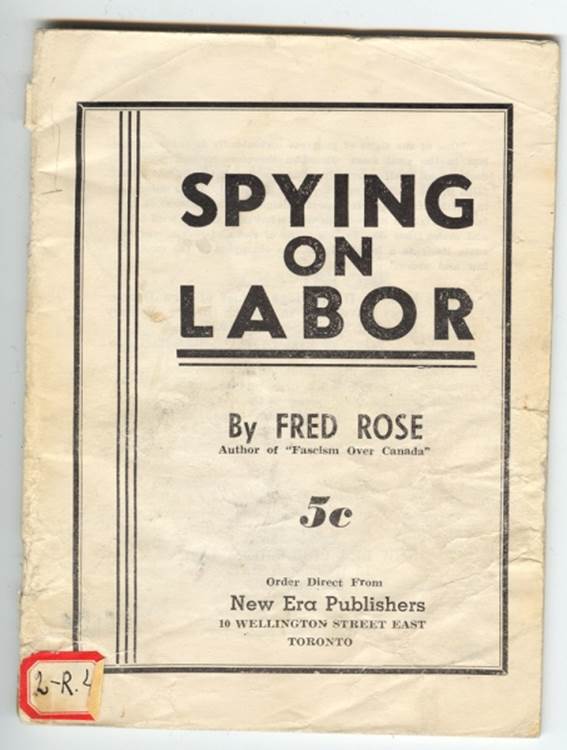 “Spying on Labor,” a political pamphlet by Fred Rose. Published by New Era Publishers, Toronto., ca. 1930s or 1940s.Photo Credit : Alex Dworkin Canadian Jewish Archives
“Spying on Labor,” a political pamphlet by Fred Rose. Published by New Era Publishers, Toronto., ca. 1930s or 1940s.Photo Credit : Alex Dworkin Canadian Jewish Archives -
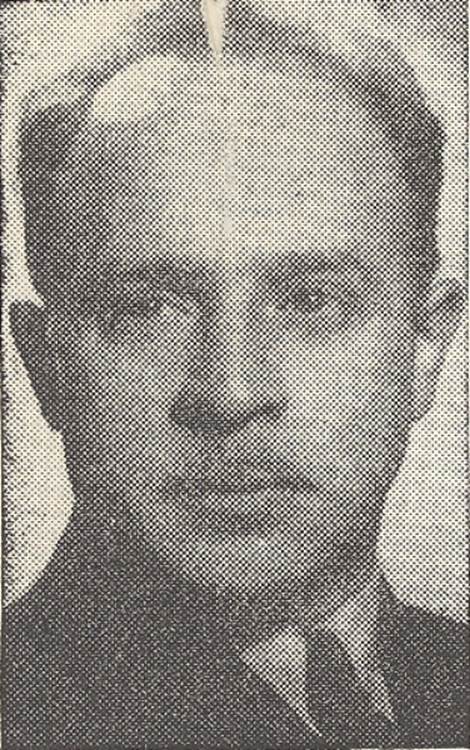 A portrait from clippings of Fred Rose, ca. 1930s or 1940s.Photo Credit : Alex Dworkin Canadian Jewish Archives
A portrait from clippings of Fred Rose, ca. 1930s or 1940s.Photo Credit : Alex Dworkin Canadian Jewish Archives -
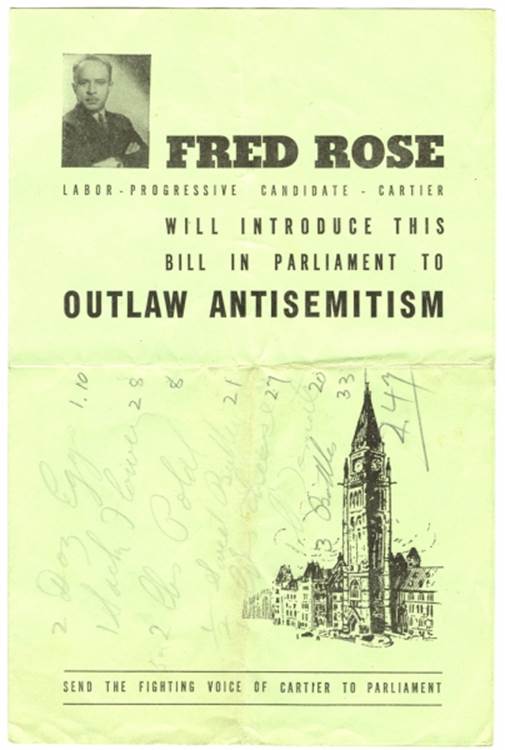 Fred Rose election poster with the Labour Progressive Party in the Cartier district, 1945.Photo Credit : Jewish Public Library - Archives
Fred Rose election poster with the Labour Progressive Party in the Cartier district, 1945.Photo Credit : Jewish Public Library - Archives
Fred Rose
Fred Rose, originally Fishel Rosenberg, was a trade union organizer who became the first Canadian MP to ever be elected as a Communist, before famously being convicted of espionage for the Soviet Union.
Rose was born in Lublin, Poland in 1907, to parents of Russian descent. He was one of six children and his father was a carpenter. He attended the Gymnaste Humaniste de Lublin, a Jewish high school for girls and boys, where he learned French.
The family immigrated to Canada in 1916, when Rose was 13. Among other jobs, he was a factory worker and electrician. In 1924, he joined the Young Communist League; as a member, he organized unions of unemployed and unskilled workers. In the 1935 federal election, Rose ran as a candidate for the Communist Party of Canada (CPC) in the working class Jewish and French Canadian neighbourhood of Cartier, ultimately coming in second.
In 1942, Rose published a pamphlet entitled Hitler’s Fifth Column in Quebec, which exposed the ties between Adolf Hitler, Benito Mussolini, and Quebec Premiere Maurice Duplessis, turning public opinion largely against Duplessis. In 1940, the Communist Party was banned, but it reappeared two years later as the Labour Progressive Party. Rose ran as the candidate for this newly-created party in 1943, and beat Lazarus Phillips and David Lewis. He was re-elected in 1945. He was popular among many Jewish Montrealers because they believed that the Soviet Union, which Rose was linked to, was the only hope for saving European Jewry from the Nazis.
In 1946, Rose was arrested and imprisoned for conspiring to forward sensitive information about the Canadian explosive RDX to the Soviets. He was tried and convicted during the Cold War spy trials, though he always maintained his innocence. He was released from jail in 1951. Stigmatized, Rose was unable to find work, so he decided to return to Poland in 1953. His Canadian citizenship was revoked in 1957. He spent the rest of his life in Poland, dying in 1983.
Although Rose left a complicated legacy, he is remembered for his devotion to the plight of the working class and to the living conditions of the Jewish people.
Special thanks to the Museum of Jewish Montreal.
Learn More:
http://imjm.ca/location/2204
http://mimj.ca/location/2209
http://www.thecanadianencyclopedia.ca/en/article/fred-rose/
http://www.jewishpubliclibrary.org/blog/?page_id=527&jdfwkey=ultmb
http://www.cjhn.ca/en/permalink/cjhn234
http://www.jewishpubliclibrary.org/blog/?page_id=527
http://www.lop.parl.gc.ca/ParlInfo/Files/Parliamentarian.aspx?Item=5cd7970f-54e0-45a0-8a5c-7e8b29ed6040&Language=E&Section=ALL
http://www.cbc.ca/archives/entry/obituary-of-fred-rose-soviet-spy (Includes short documentary)

-
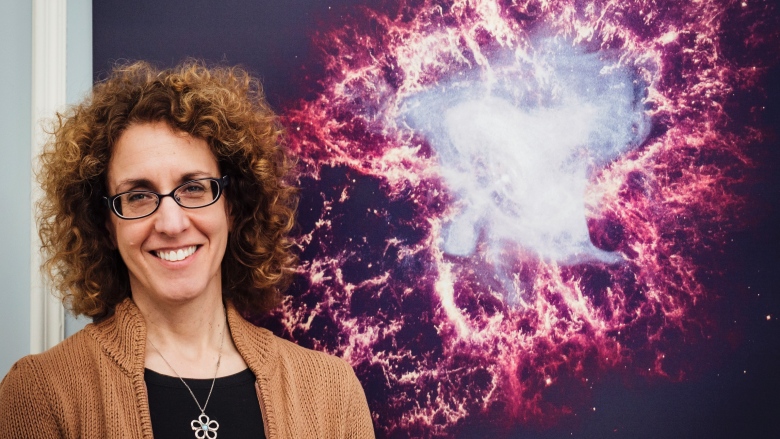
-
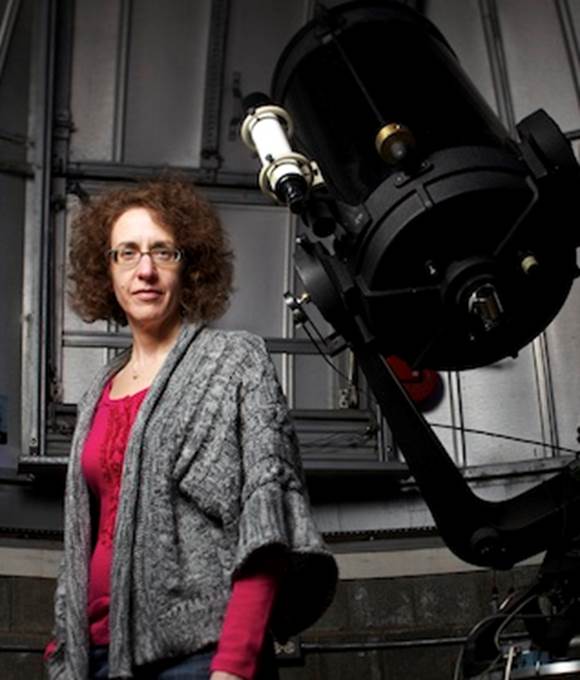 Victoria Kaspi is the Lorne Trottier Chair in Astrophysics and Cosmology and Canada Research Chair in Observational Astrophysics.Photo Credit : Natural Sciences and Engineering Research Council of Canada and McGill Publications
Victoria Kaspi is the Lorne Trottier Chair in Astrophysics and Cosmology and Canada Research Chair in Observational Astrophysics.Photo Credit : Natural Sciences and Engineering Research Council of Canada and McGill Publications -
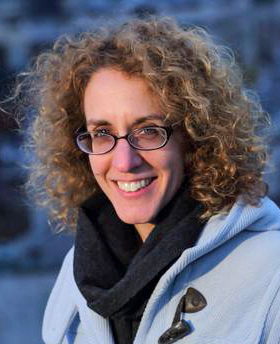
Victoria Kaspi
Victoria Kaspi is a leading physicist, whose work in astrophysics has garnered her many prestigious awards and fellowships.
Born in the US, Kaspi moved to Canada when she was seven years old. She earned her undergraduate degree in Physics at McGill and her PhD at Princeton, prior to returning to McGill to teach in 1999.
Kaspi’s research focuses on the behaviour of “zombie stars”: stars that are running out of fuel but have not yet collapsed into black holes. This intermediate stage provides scientists with opportunities to test theoretical ideas that are impossible to test on earth. The Canadian government has recognized Kaspi’s scientific contributions as having “had a major impact in the field of astrophysics.”
Kaspi has been the recipient of multiple awards, including the Annie J. Cannon Award in Astronomy of the American Astronomical Society, the Herzberg Medal of the Canadian Association of Physicists, the Steacie Prize, the Rutherford Memorial Medal of the Royal Society of Canada and the Polanyi Award. She is also a Fellow of the Royal Society. In 2009, she won the Prix Marie-Victorin, the most prestigious scientific award in Quebec. In 2016, she won the Gerhard Herzberg Canada Gold Medal from the Natural Sciences and Engineering Council of Canada – the first woman, and one of the two youngest people in Canada, to ever win the prestigious $1M research fellowship. She intends to use the money to investigate “fast radio bursts” – powerful, very short radio pulses from somewhere far away in the universe.
Learn More:
http://www.cbc.ca/news/technology/herzberg-kaspi-1.3205517
http://www.physics.mcgill.ca/~vkaspi/
http://www.theglobeandmail.com/news/national/mcgill-astrophysicist-is-first-woman-to-win-canadas-top-science-award/article28762732/

-
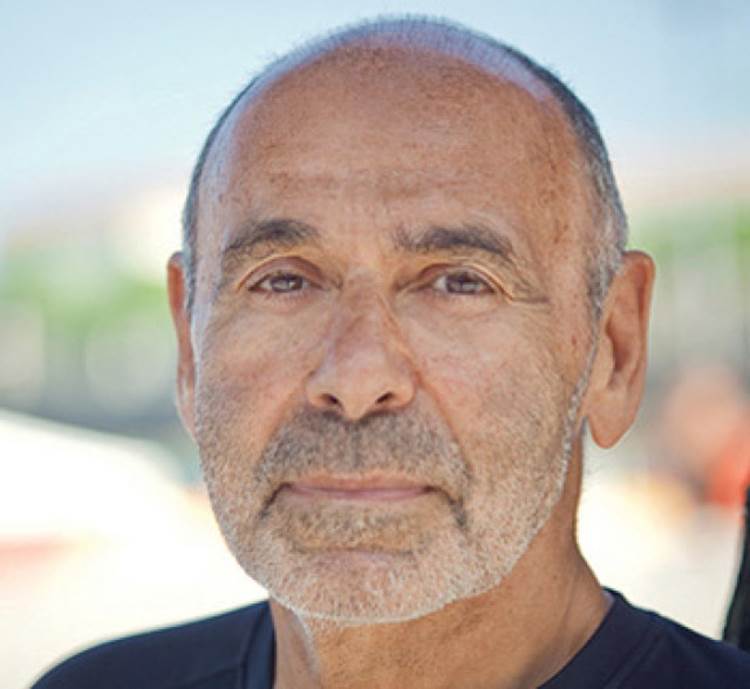 Jacques Bensimon.Photo Credit : Canadian Jewish News
Jacques Bensimon.Photo Credit : Canadian Jewish News -
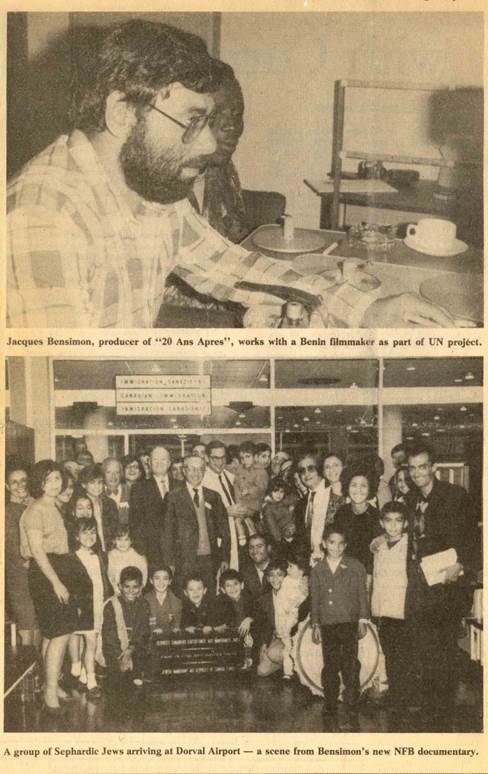 Clippings of Jacque Bensimon, depicting him filming the arrival of Sephardic Jews at Dorval Airport in the 1950s.Photo Credit : Alex Dworkin Canadian Jewish Archives
Clippings of Jacque Bensimon, depicting him filming the arrival of Sephardic Jews at Dorval Airport in the 1950s.Photo Credit : Alex Dworkin Canadian Jewish Archives -
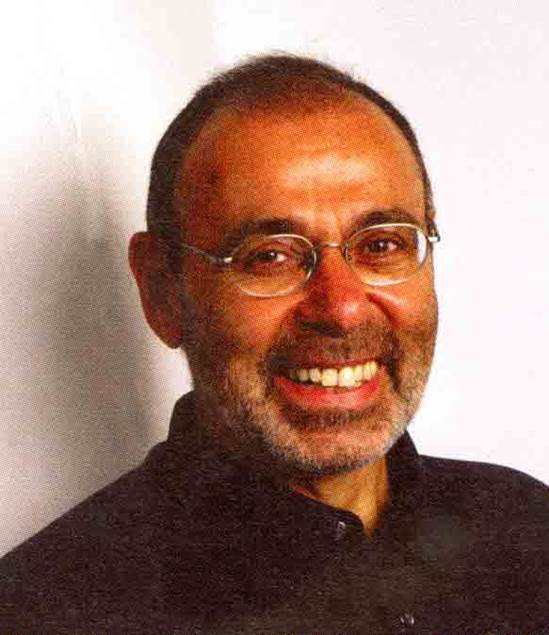 Jacques Bensimon.Photo Credit : Alex Dworkin Canadian Jewish Archives
Jacques Bensimon.Photo Credit : Alex Dworkin Canadian Jewish Archives
Jacques Bensimon
Jacques Bensimon was a writer, director and leader in Canadian film and television who fostered diversity, innovation and social engagement.
Born in Agadir, Morocco, Bensimon and his family (including his three sisters) immigrated to Montreal in 1958. He completed a Film Studies degree at New York University. In 1967, he began working at the National Film Board of Canada (NFB) as an editor, director, producer and scriptwriter and quickly developed a reputation as a rising star in filmmaking. He contributed to the production of over 30 NFB films including the direction of Once Agadir (1971), a fantastical reflection on his hometown following the devastating 1960 earthquake, and 20 ans après (1977), an exploration of the challenges faced by Francophone Sephardic Jews as they began to integrate into Quebec society during the 20 years following their immigration.
Talented and bilingual, Bensimon became managing director of TFO, the French-language network of TV Ontario when it launched in 1987. During his mandate he helped to establish partnerships and co-production agreements with major television distributors around the world, like BBC, Arte and France Televisions. The exportation of much of Canada’s French-language media programming remains indebted to the work and institutional relationships fostered by Bensimon.
In 2001, Bensimon was named Government Film Commissioner and Chairperson of the National Film Board of Canada. He occupied this position until his retirement in 2006, solidifying his position as a leader in the development of Canadian film and television. He also served in key positions at the Banff Television Festival and Cinémathèque québécois. In 1998, Bensimon was named a Knight of the Order of Arts and Letters from the Government of France for his accomplishments at the TFO. In 2005, he was named a member of the Order of Canada, and received an honorary doctorate in Letters from York University in Toronto.
Bensimon passed away from cancer at age 69, just months before his memoir, Agadir, un paradis dérobé, was published by Éditions L’Harmattan.
Text compiled by Stephanie Schwartz, special thanks to the Museum of Jewish Montreal.
Learn more:
https://www.nfb.ca/explore-all-directors/jacques-bensimon/
https://www.nfb.ca/film/making_movie_history_jacques_bensimon
http://blog.nfb.ca/blog/2012/08/27/jacques-bensimon/
http://www.theglobeandmail.com/arts/film/cultural-champion-jacques-bensimon-left-indelible-mark-on-nfb/article4503930/
http://www.huffingtonpost.ca/jacques-bensimon/canada-budget-2012_b_1410043.html

-
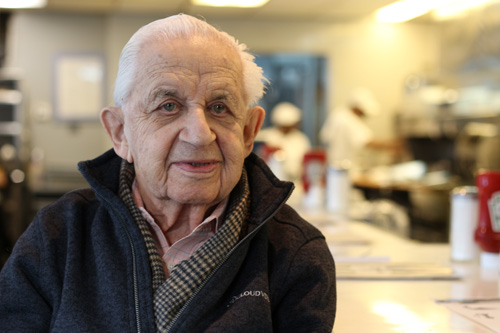 Hymie Sckolnick, 2017.Photo Credit : Miguel Banet
Hymie Sckolnick, 2017.Photo Credit : Miguel Banet -
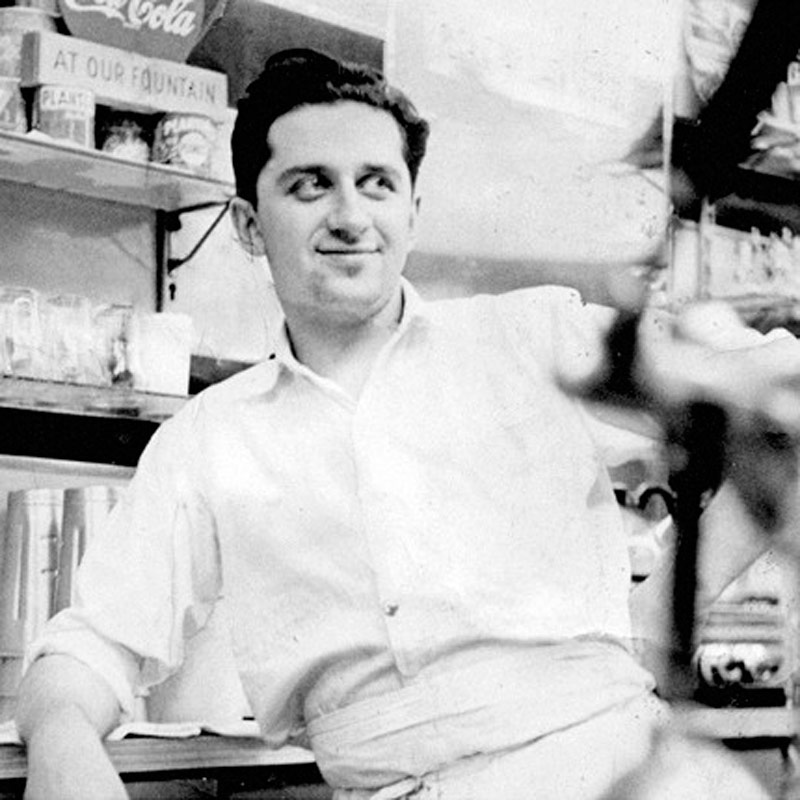 Hymie Sckolnick –n.d.Photo Credit : Beauty's Luncheonette
Hymie Sckolnick –n.d.Photo Credit : Beauty's Luncheonette -
 The famous mish-mash omelette.Photo Credit : Miguel Banet
The famous mish-mash omelette.Photo Credit : Miguel Banet -
 The Nova bagel.Photo Credit : Miguel Banet
The Nova bagel.Photo Credit : Miguel Banet
Beauty’s Luncheonette
Hyman (Hymie) Sckolnick was the founder of Montreal culinary institution, Beauty’s Luncheonette, on the Plateau Mont-Royal.
Sckolnick and his new bride, Freda, bought the Bancroft Stationary Store Snack Bar at the corner of St-Urbain and Mount-Royal in 1942. Freda began by making sandwiches for the workers in the nearby Jewish garment factories. With increasing demand for her delicious lunches, the Sckolnicks began to serve more and more lunches on weekends. The factory workers would bring their families to eat there, too, which instituted Sunday brunch at the restaurant. Although it was formally known as the Bancroft Snack Bar, it has always been colloquially called Beauty’s, after Hymie’s bowling nickname.
Freda’s signature creations are the Beauty’s Special (cream cheese, lox, onion and tomato on bagel) and the Mish Mash (a hot dog, salami, green pepper and fried onion omelette). The ubiquitous half hour lineups are a testament to the quality of the food. The interior, which has the ambience of a retro 1940s diner, is decorated with letters, write-ups and photos of local and international stars who visited, ate and schmoozed there. The executive producer of the (at the time) Late Show with David Letterman even wrote, “You’re the only reason to come to Canada!”
An intergenerational family business, Hymie’s children and grandchildren helped him run the restaurant, and Hymie himself has greeted and seated customers there every day since 1942.
Learn more:
https://thegrilledproject.com/2016/09/22/making-beautys-a-montreal-landmark-since-1942-hymie-and-larry-skolnick-speak/
http://www.themainmtl.com/2015/03/beautys-hymie-sckolnick-montreal/

-
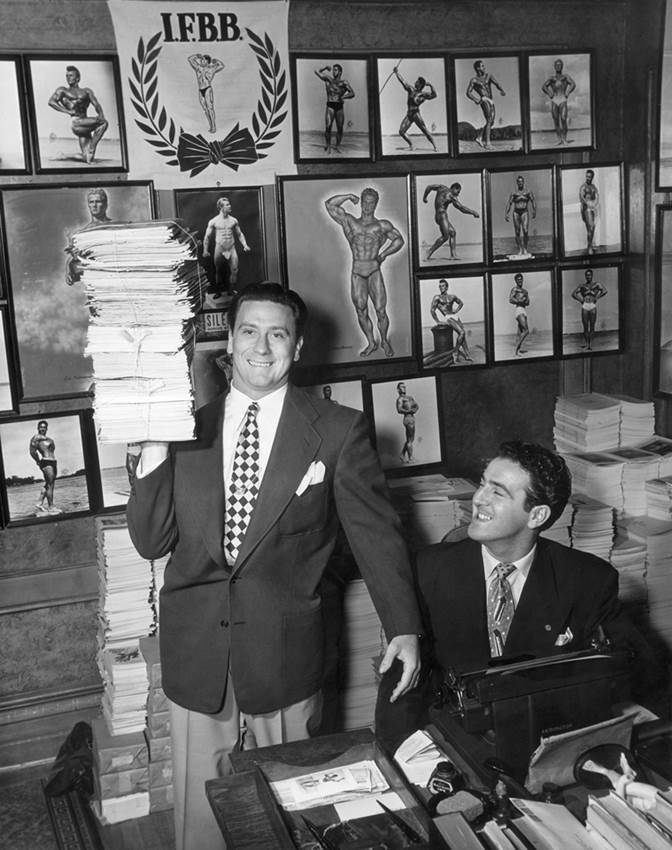 In 1946, Joe and Ben began promoting bodybuilding competitions, starting with the Mr. Canada contest.Photo Credit : joeweider.com
In 1946, Joe and Ben began promoting bodybuilding competitions, starting with the Mr. Canada contest.Photo Credit : joeweider.com -
 Joe Weider's "Most Muscular Man" pose was often used as his picture byline in magazines.Photo Credit : joeweider.com
Joe Weider's "Most Muscular Man" pose was often used as his picture byline in magazines.Photo Credit : joeweider.com -
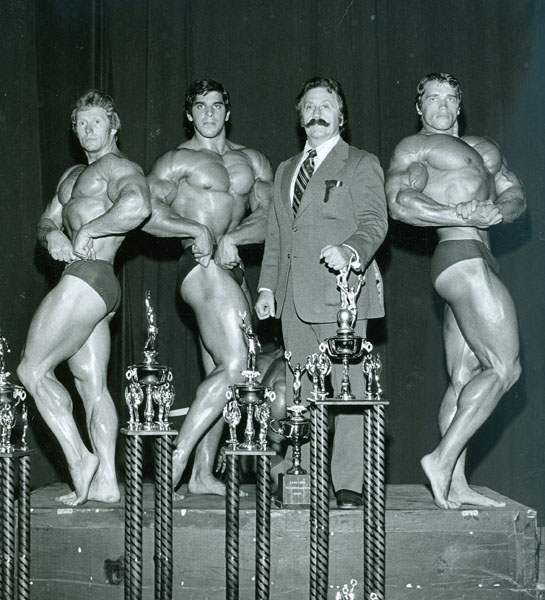 1973: Ken Waller (Mr. World), Lou Ferrigno (Mr. America), Joe Weider and Arnold Schwarzenegger (Mr. Olympia).Photo Credit : joeweider.com
1973: Ken Waller (Mr. World), Lou Ferrigno (Mr. America), Joe Weider and Arnold Schwarzenegger (Mr. Olympia).Photo Credit : joeweider.com -
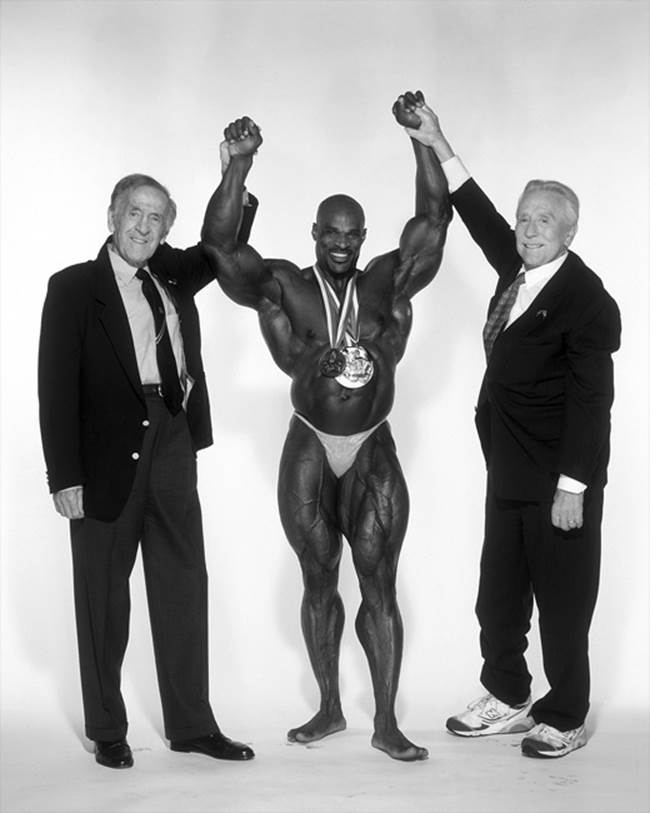 2002: Ben and Joe Weider with Ronnie Coleman.Photo Credit : joeweider.com
2002: Ben and Joe Weider with Ronnie Coleman.Photo Credit : joeweider.com -
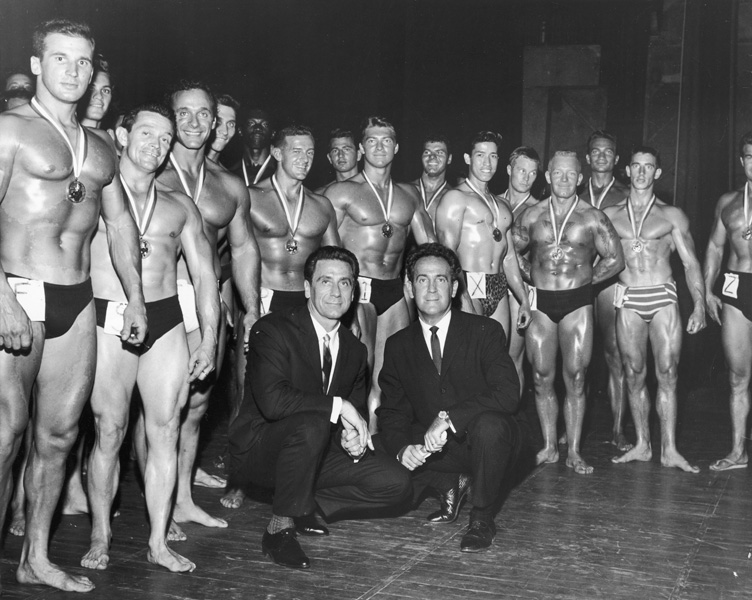 Joe Weider and Ben Weider and athletes at the 1962 America/Universe ContestPhoto Credit : joeweider.com
Joe Weider and Ben Weider and athletes at the 1962 America/Universe ContestPhoto Credit : joeweider.com -
 Joe Weider with Arnold Schwarzenegger on the set of "Predator".Photo Credit : joeweider.com
Joe Weider with Arnold Schwarzenegger on the set of "Predator".Photo Credit : joeweider.com -
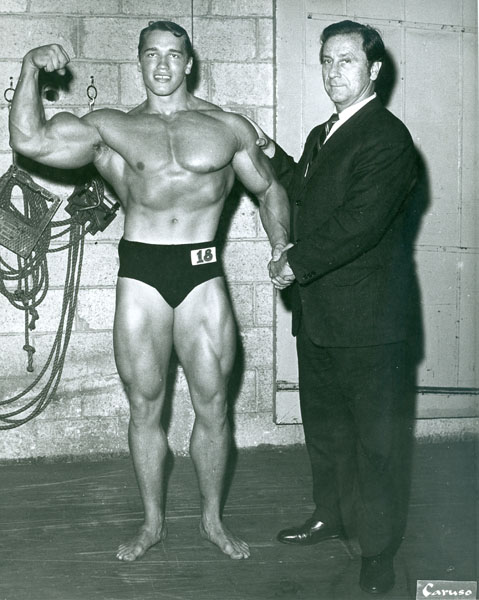 Joe Weider with Arnold Schwarzenegger at the 1968 Mr. Universe.Photo Credit : joeweider.com
Joe Weider with Arnold Schwarzenegger at the 1968 Mr. Universe.Photo Credit : joeweider.com
Ben and Joe Weider
Ben and Joe “The Master Blaster” Weider were bodybuilding promoters who helped turn the sport into a mainstream, competitive activity by founding the International Federation of Body Builders (IFBB), the Mr. Olympia bodybuilding competition and the first ever sports nutrition company, Weider Nutrition.
Born in Montreal to Polish parents, the boys grew up in a tough neighborhood, where Ben was frequently attacked by bullies. Inspired by a Charles Atlas magazine, they began weightlifting at home with improvised equipment to bulk up. At 18, Joe won the Quebec Weightlifting Competition, the top weightlifting competition at the time.
In 1940, the brothers began publishing a bodybuilding magazine called Your Physique, because they felt that the current fitness magazines were not scientifically-based. By 1943, the magazine had a large circulation and was being distributed all across Canada. A bodybuilding empire soon followed, expanding to include fitness equipment and supplements. In 1969, the brothers found their perfect spokesmodel in Arnold Schwarzengger, an Austrian bodybuilder, who had been following the Weider method. Bringing him to California, where Joe was then living, Schwarzenegger was trained and primed to be the public face of Weider products. In return, Schwarzenegger fronted for the Weider supplements and equipment on talk shows and in magazines, his charm and wit endearing him to audiences and resulting in increased sales for the Weiders.
The Weiders broke down barriers in bodybuilding for women and minorities, opening doors for black, Hispanic and female athletes to compete in competitions and be featured in health and fitness magazines. Longtime supporters of Montreal’s Jewish community, the brothers were honoured by the Young Men’s Hebrew Association of Montreal, now called the Ben Weider Jewish Community Centre. They were also both prolific authors (Joe mostly wrote about bodybuilding, and Ben on Napoleonic history, an area of expertise for which he was internationally known).
Joe has won the 2014 International Sports Hall of Fame Award, Pioneer Fitness Award and the Venice Muscle Beach Hall of Fame’s Lifetime Achievement Award. Ben’s awards include the Order of Canada and the Order of Quebec, along with the French Legion of Honour; in 1984, he was nominated for the Nobel Peace Prize.
Learn more:
http://www.joeweider.com/
http://www.bodybuilding.com/fun/joe-weider-1919-2013-remembering-the-father-of-bodybuilding.html
https://www.youtube.com/watch?v=wDC630358ks
https://www.youtube.com/watch?v=0ymY-ahWa_U
https://www.youtube.com/watch?v=Roi1MmGf9Ps
https://www.youtube.com/watch?v=yi6HR2eVAMo
https://www.youtube.com/watch?v=14o76Ws9JOw
https://www.youtube.com/watch?v=5WCVB-GnK18

-
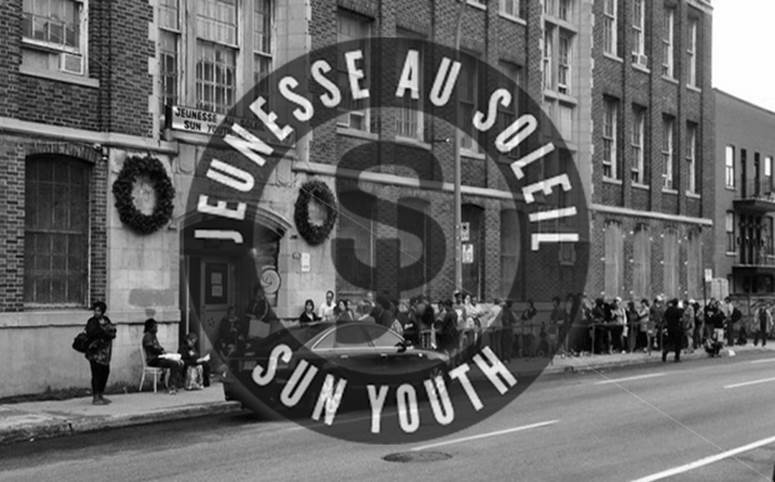 Sun Youth logo, 2014.Photo Credit : Sun Youth
Sun Youth logo, 2014.Photo Credit : Sun Youth -
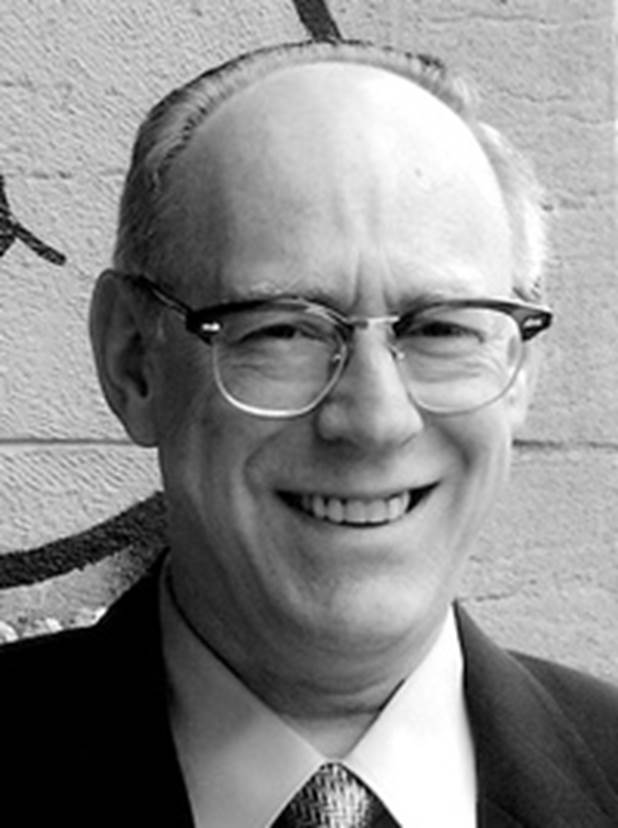 Sid Stevens.Photo Credit : Board of Trade of Metropolitan Montreal
Sid Stevens.Photo Credit : Board of Trade of Metropolitan Montreal -
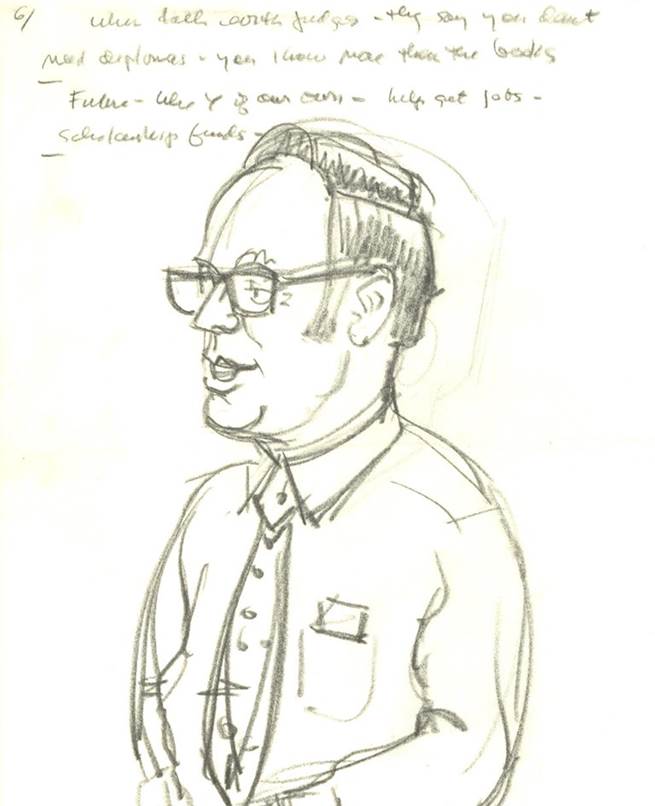 Sid Stevens sketch and profile by Lou Seligson in the Montreal Star, 1973.Photo Credit : Alex Dworkin Canadian Jewish Archives
Sid Stevens sketch and profile by Lou Seligson in the Montreal Star, 1973.Photo Credit : Alex Dworkin Canadian Jewish Archives
Sid Stevens
The co-founder of Sun Youth, Sid Stevens, is a social and community developer who has devoted his life to uplifting economically struggling individuals and communities throughout Montreal.
Stevens grew up in an Ashkenazi Jewish family, surrounded by a supportive community, yet, like many new immigrants, he struggled to escape poverty. His insider’s understanding of the difficulties faced by many vulnerable families inspired him to find practical solutions to issues affecting people in his community; he went on to use his own challenges as fuel to combat social inequalities for future generations.
In 1954, when Stevens was still a teenager, he and his friend Earl De La Perralle created a recreation group for neighbourhood youth, which became the prototype for Montreal’s community service organization, Sun Youth. Today, Sun Youth provides a wide range of services to over 300,000 individuals in Montreal. The thriving organization, which Stevens is Executive Vice President of, runs programs including food and clothing banks, youth summer camps, emergency services, crime prevention services and recreational facilities.
In addition to his work with Sun Youth, Stevens was elected to Montreal City Council in 1978, and quickly earned the admiration of the broader Montreal community with his compassion, leadership and public service initiatives.
Stevens has received many accolades for his dedication to the community. In 1986, he was given the Dawson College Award for his outstanding contribution to public life. In 1989, the Department of Multiculturalism and Citizenship awarded him a citizen’s commendation. In 1992, he was honoured by the Quebec Psychiatric Association for his social commitment and recognized by the Conseil du citoyen de Montréal for his generosity to the community and his contribution to the well-being of his fellow citizens and humanity in general. He was a finalist for Entrepreneur of the Year in 1995. In 2002, McGill University awarded him an honorary doctor of laws. And in 2009, the Jewish Eldercare Centre Auxiliary honoured him for his outstanding contribution to the community.
Learn more:
http://montrealgazette.com/news/local-news/sun-youth-when-a-community-gave-its-two-cents-worth
http://grandsmontrealais.ccmm.qc.ca/en/6/
http://sunyouthorg.com/en/about/timeline/

